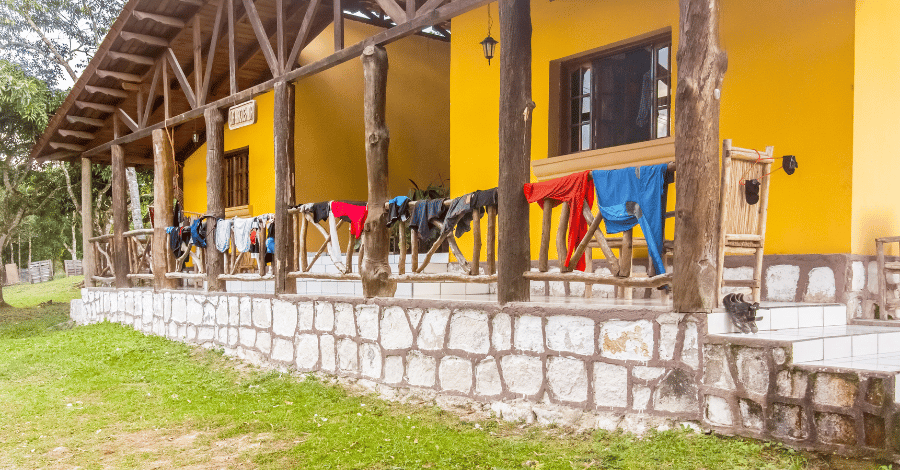Have you ever thought of taking a vacation while also minimizing your environmental impact? An ecolodge is a perfect solution, offering an immersive nature experience with minimal harm to the surrounding environment. Through thoughtful design and management, eco-lodges provide guests with comfortable accommodations sustainably sourced from local resources. So what exactly is an ecolodge?
What is an ecolodge?
An ecolodge is a type of hotel or accommodation intended to have minimal impact on nature while providing hospitality services with an emphasis placed on environmental responsibility, sustainability, and cultural connection. The primary goal of this style of lodging focuses both on economic prosperity as well as harmoniously living within their natural surroundings by using locally sourced and eco-friendly materials during construction when possible.
Ecolodges often include additional features such as tours that are focused around educating guests about the local ecology and other eco-friendly activities. Most lodges also offer a variety of accommodations from rustic luxury to room rental options made with locally sourced materials. Many are situated in remote locations surrounded by wilderness areas or villages that allow guests to observe wildlife from the comfort of their lodging while immersed in nature and its beauty.

Ecolodging is becoming increasingly popular for adventure seekers who want an unforgettable experience of living socially responsibly within natural surroundings. This provides them an opportunity for exploration as well as an opportunity of giving back to local communities and their respective ecosystems.
The concept of “leave no trace” is highly encouraged at these lodgings, accomplished by using renewable energy sources, conservation practices for all waste products, resourceful water usage due to limited access in remote areas, as well as composting initiatives which significantly reduce the amount of trash produced from visitor stays. This type of accommodation provides a unique opportunity to travel sustainably while maintaining minimal impact on our natural environments.
Why are ecolodges popular?
In recent years, ecolodges have skyrocketed in popularity due to their focus on sustainability and responsible tourism. This type of accommodation provides an experience that helps guests better appreciate the natural world while also being mindful that they are living amongst it too. By blending traditional concepts with modern eco-tourism such as eco-friendly building materials, locally sourced food produce, and a wide array of animal-watching activities, eco-lodges provide a unique way for travelers to make meaningful connections with nature through conservation.
Ecolodges can be found in a variety of locations, from jungles to mountain ranges, and beaches. These havens for travelers provide an array of opportunities to engage with local culture, partake in community initiatives and go on leisurely animal-watching expeditions, all while keeping their practices environmentally friendly. Those who stay at ecolodges often return home feeling satisfied that by choosing this type of housing they are encouraging well-maintained habitats and responsible tourism practices.
What is ecotourism?
Ecotourism is a form of tourism that focuses on the protection, conservation, and responsible enjoyment of natural environments. It is designed to promote both environmental sustainability as well as socio-economic benefits for local people living in such sites. Ecotourism involves activities like camping, bird watching, nature photography, sightseeing, and various recreational activities like hiking or trekking through remote areas where human interference has been kept to a minimum.

Ecotourism makes use of principles from sustainable development which seeks to ensure that natural resources are not overused or damaged by tourism activities. It aims to help preserve local wildlife and culture without causing any detrimental effects, as well as create educational programs for the benefit of both tourists and host communities. Additionally, ecotourism helps support projects that can serve to protect a particular area from degradation caused by commercial activity or agricultural use.
Ecotourism destinations focus on providing visitors with opportunities to observe nature and discover innovative solutions to sustainability issues. It also promotes environmental education, encourages people to live lightly in areas impacted by tourism, and advocates for the development of local communities which provide ecotourism services without damaging their environment or culture. This fashion of sustainable travel focuses on learning about an area’s natural heritage and is dedicated to respecting nature and vulnerable ecosystems.
What are the differences between ecolodge vs hotel?
An ecolodge is a type of accommodation that focuses on minimizing its environmental impact by using sustainable methods. Ecolodges can be found as lodges, inns, or even resorts located in natural settings, such as jungles, mountains, deserts, or bodies of water. This type of eco-friendly lodging tends to have features such as alternative energy sources for electricity, hot baths/showers, and composting toilets.
It also will typically have local cuisine that includes organic ingredients grown nearby the lodge, and participate in efforts to reduce and reuse the water. Such an accommodation typically carries a greater up-front cost due to the expensive nature of sustainable practices. However, it significantly reduces its environmental impact in comparison with other traditional forms of lodging such as hotels and resorts.
Hotels, by contrast, are concentrated more on convenience than sustainability. They will often require large amounts of energy for air conditioning systems across each room which increases their energy consumption greatly. On the other hand, ecolodges adopt alternate methods to coexist with the environment around them such as using insulation to minimize the need for cooling.
Aside from reducing energy, there are other differences as whereas ecolodges use local resources and recycle, hotels tend not to emphasize naturalistic features throughout their structures or efficiency measures to reduce waste. Another way where hotels differ from ecolodges can be found in their location, as hotels are usually situated near cities and towns, while ecolodges are usually located near nature areas.
How to find an ecolodge?
Finding an eco-friendly lodge can be a challenging prospect, but the process of doing so is becoming increasingly easier each year. An ecolodge is essentially defined by its close relationship to nature and focuses on sustainable practices as part of its operations, they are typically characterized by small size and simple accommodations while having emphasis placed upon outdoor activities that showcase local culture and ecology. With this in mind, here are some tips for finding your ideal ecolodge:
Firstly, research online to get a sense of the most reliable ecolodge options in your desired region. You can find reviews from other travelers, recommendations, or even local companies that have partnered with lodging facilities to create fully sustainable experiences for those seeking eco-tours. Doing sufficient research and having an open mind when it comes to the scope of accommodation available will allow you to discover hidden gems online as well as potentially more cost-effective ones.
Secondly, look into ecotourism-certified accommodations where possible – this is a great way of knowing you’re choosing an ecolodge with proper ‘eco-credentials.’ With those that hold certification, stringent criteria must be met to ensure the business operates in ways both ethical and sustainable for staff as well as respecting local people and environmental practices within its operation.
Finally, another primary factor when it comes to finding your ideal accommodation is price, make sure you are aware of any hidden costs when making your decisions since all too often there are miscellaneous expenses that can filter through. Consider things such as food, activities, and any additional transportation fees associated with the ecolodge when locked into a deal or making an agreement.
How to choose an ecolodge?
Choosing an ecolodge for a vacation experience should involve thoughtful consideration of the destination and its features. An ecolodge is defined as an accommodation that has been intentionally designed to have a minimal environmental impact while providing guests with direct experiences in the promotion of eco-consciousness, sustainability, and sharing authentic local cultures. When selecting an eco-lodge property you must consider whether it meets your exact requirements where the service provided exceeds expectations without compromising on ecological responsibility or comfort amenities.
The key question you must ask yourself is: does it adhere to local regulations or even surpass them in every aspect ranging from electricity usage and waste management to supporting the local communities? Reviewing available resources such as a property’s website or guides can give insight into their ecological conscience.
You can find different types of ecolodges in Europe, depending on the type of experience you’re looking for. Choosing an ecolodge should also take into account the experience guests have during their stay there. You can do this by reading reviews online. More thought must be taken into what the facility has to offer and how that can add value to your kind of trip.
Find out about some of the places you can explore, the local attractions, and the activities available during your stay. Ask for tips on favorite spots close by or even talk with other travelers who had visited this destination before to get an idea of if it’s the right fit for you.

